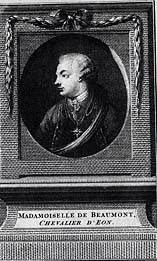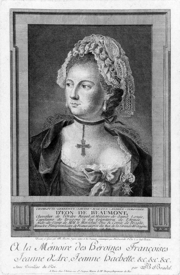D'Éon: French Spy
 This morning, I finished reading Jo Beverley's Winter Fire with a satisfied sigh. That feeling of having been in presence of a good story in the hands of a talented writer never fails to surface when I read JoBev's work. Winter Fire is a Christmas story about the Marquess of Ashart set at the Malloren stronghold Rothgar Abbey. And wherever the Marquess of Rothgar is, the tales of French spy Charles d'Éon de Beaumont are never far behind, given the tangled history between the two men.
This morning, I finished reading Jo Beverley's Winter Fire with a satisfied sigh. That feeling of having been in presence of a good story in the hands of a talented writer never fails to surface when I read JoBev's work. Winter Fire is a Christmas story about the Marquess of Ashart set at the Malloren stronghold Rothgar Abbey. And wherever the Marquess of Rothgar is, the tales of French spy Charles d'Éon de Beaumont are never far behind, given the tangled history between the two men.
Imagine my surprise then, when I turned to my daily calendar of Forgotten English by Jeffrey Kacirk, to find that today is d'Éon's birthday. He was a French diplomat, spy, and soldier of the Georgian era (1728–1810). His full name also included the names Geneviève, Louis, Auguste, André, and Thimothée. As d'Éon claimed throughout his life, he began life as a baby girl. However, his parents stood to inherit a fortune only if they had a male offspring, so d'Éon "became male." In 1756, as Le Chevalier d'Éon, he enlisted in Louis XV's spy network Le Secret du Roi. He was posted to the Russian court of Empress Elizabeth, where he donned the guise of a maid of honor to the empress in order to pass secrets between the two courts.
In 1756, as Le Chevalier d'Éon, he enlisted in Louis XV's spy network Le Secret du Roi. He was posted to the Russian court of Empress Elizabeth, where he donned the guise of a maid of honor to the empress in order to pass secrets between the two courts.
In 1761, he chose to return as a man to France, and two years later, he moved to London as part of the diplomatic corps as a man. A betting pool was started on the London Stock Exchange to prove his sex. He was invited to participate, but he declined.
In 1774, d'Éon negotiated his successful return to the French court of Louis XVI, but there he was compelled to dress as a woman, because he insisted in wanting to be recognized as one. Thereafter, d'Éon stayed as woman, even when he returned to England in 1785.
Unfortunately for him, he died in London, where English physicians conducted a postmortem analysis and gleefully proclaimed that d'Éon was anatomically male. They then proceeded to coin a term Eonism to denote cross-dressing behavior (obviously prefering to forget about Shakespeare and all other English fans of cross-dressing.)
Another coincidence to a book I recently finished, Dan Brown's The Lost Symbol, d'Éon was a Freemason.

0 comments:
Post a Comment